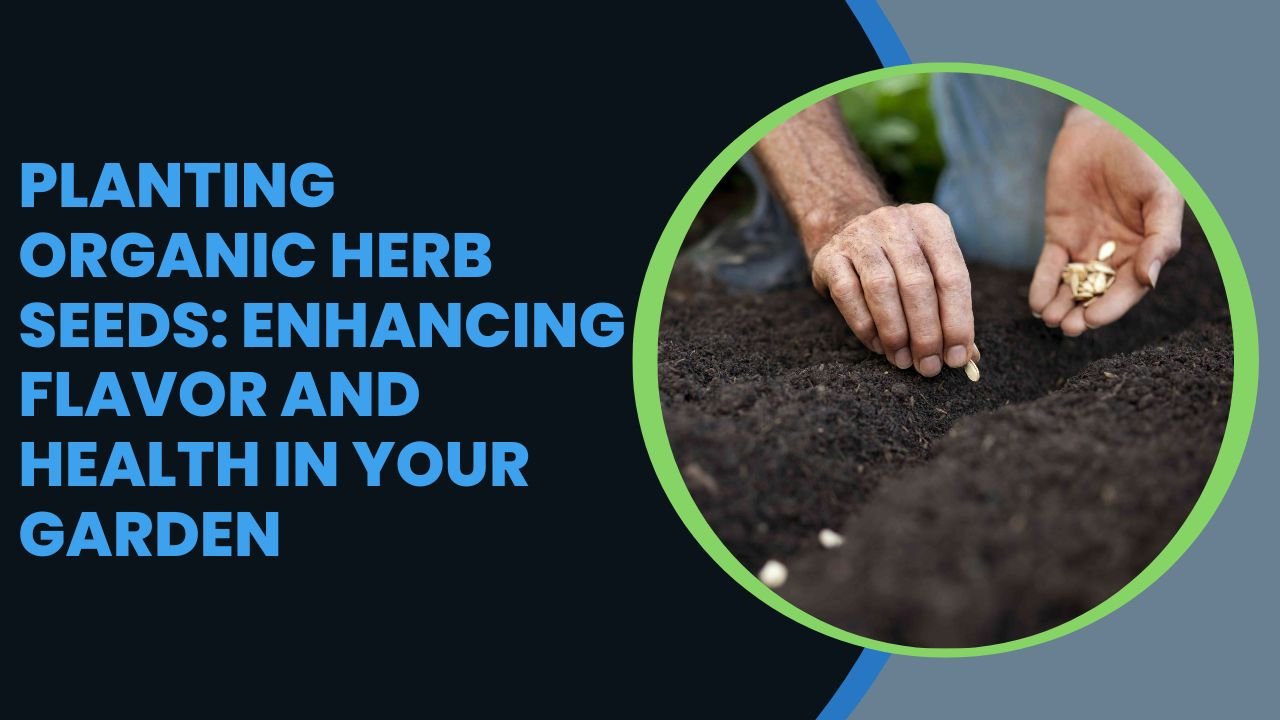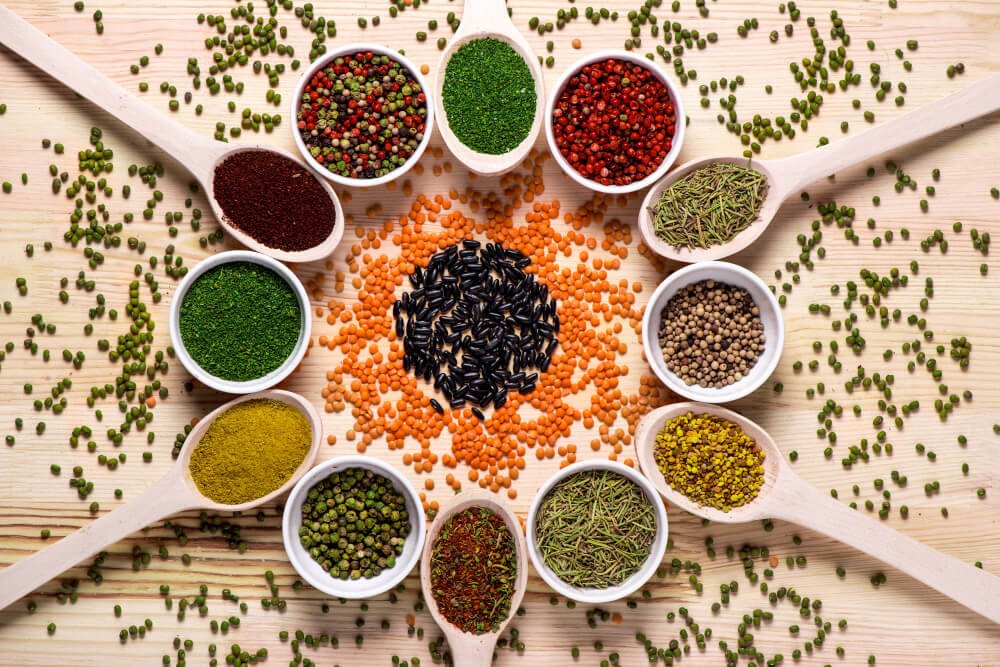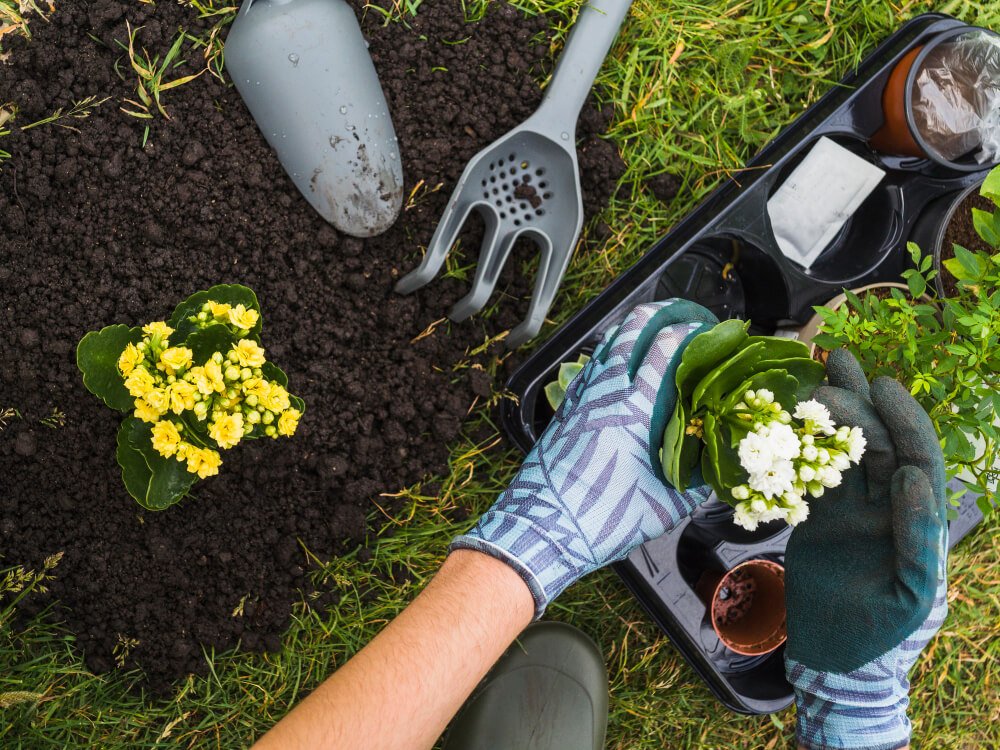Herbs have been used for centuries as flavor enhancers in culinary dishes, natural remedies for various ailments, and even in beauty and personal care products.
With the rising popularity of organic gardening and a growing concern for the environment, many people are now opting to grow their own organic herbs. Planting organic herb seeds allows you to have control over the quality of the herbs you consume, ensuring they are free from harmful chemicals and pesticides.

The Benefits of Planting Organic Herb Seeds
Enhanced Flavor
One of the key advantages of planting organic herb seeds is the incredible flavor they add to your meals. Organic herbs are known to have a more robust and intense taste compared to their conventionally grown counterparts. The absence of synthetic fertilizers and pesticides allows the herbs to develop their natural flavors, resulting in a more aromatic and satisfying culinary experience.
Health Benefits
Organic herbs not only provide a burst of flavor but also offer numerous health benefits. They are rich in essential vitamins, minerals, and antioxidants that promote overall well-being. Incorporating organic herbs into your diet can help boost your immune system, aid digestion, and provide a natural source of vitamins and minerals necessary for optimal health.
Environmental Impact
Choosing organic herb seeds supports environmentally-friendly practices. Organic farming methods promote soil health, biodiversity, and sustainable water management. By avoiding the use of synthetic chemicals, you contribute to the preservation of ecosystems and protect beneficial insects and pollinators. Additionally, organic gardening reduces water contamination and promotes a healthier environment for both humans and wildlife.
Read Also: The Ultimate Guide to Vegetable Seeds for Container Gardening
Choosing the Right Organic Herb Seeds

Before diving into planting organic herb seeds, it’s essential to select the right varieties that suit your preferences and growing conditions.
Researching Herb Varieties
Different herbs thrive in various climates and growing conditions. Conduct thorough research on the herbs you want to grow, considering factors such as sunlight requirements, temperature preferences, and soil conditions. This knowledge will help you make informed decisions and ensure successful herb cultivation.
Quality and Source of Seeds
When choosing organic herb seeds, it’s crucial to opt for high-quality seeds from reputable sources. Look for seeds that have a high germination rate and are free from contaminants. Buying from trusted organic seed suppliers or local nurseries specializing in organic products can provide you with reliable options.
Organic Certification
To ensure the authenticity of your organic herb seeds, look for those that are certified organic. Seeds with organic certification have been produced according to strict organic standards, guaranteeing that they are free from genetically modified organisms (GMOs) and synthetic chemicals.
Read Also: Discover the Beauty of Heirloom Seeds for Container Gardening
Preparing Your Garden for Planting

To create an ideal environment for your organic herb seeds to flourish, proper garden preparation is crucial.
Selecting the Ideal Location
Most herbs prefer a sunny location with at least six hours of direct sunlight daily. Choose a spot in your garden that receives ample sunlight and offers protection from strong winds. Proper air circulation is also essential to prevent the development of fungal diseases.
Soil Preparation
Before planting organic herb seeds, it’s important to prepare the soil. Remove any weeds or grass from the designated area, ensuring that the soil is free from competing vegetation. Loosen the soil using a garden fork or tiller, and incorporate organic matter such as compost or well-rotted manure to improve soil fertility and drainage.
Proper Drainage and Watering
Herbs generally prefer well-draining soil to prevent root rot and other water-related issues. Ensure that the garden bed has proper drainage to avoid waterlogging. Additionally, establish a regular watering routine, providing sufficient moisture without overwatering the herbs.
Read Also: Organic Seeds for Hydroponic Gardening: A Green Thumb’s Choice
Planting Organic Herb Seeds
The process of planting organic herb seeds can vary depending on the specific herb variety and its recommended planting method.
Seed Starting Indoors
Some herbs benefit from starting seeds indoors before transplanting them to the garden. This method allows you to get a head start on the growing season and ensure a higher germination rate. Use seed trays or pots filled with a seed starting mix, and follow the instructions on the seed packet for proper sowing depth and spacing.
Direct Seeding
Certain herbs, such as dill and cilantro, are best sown directly into the garden soil. Prepare the soil by removing any debris, and create small furrows or shallow holes for the seeds. Place the seeds according to the recommended spacing and cover them with a thin layer of soil. Water gently to keep the soil moist until the seeds germinate.
Transplanting Seedlings
For herbs that require a longer growing season or have delicate roots, starting seeds indoors and transplanting the seedlings is the preferred method. Once the seedlings have developed a few sets of true leaves, carefully transplant them into the prepared garden bed. Ensure that the soil is moist and firm around the roots to promote proper establishment.
Read Also: Burpee Organic Seeds: Your Go-To for Successful Gardening
Caring for Your Herb Garden

Maintaining a healthy herb garden involves regular care and attention to ensure optimal growth and productivity.
Regular Watering and Fertilizing
Herbs generally require consistent moisture, but overwatering can lead to root rot. Water the plants when the top inch of soil feels dry, aiming to keep the soil evenly moist. Avoid wetting the foliage to prevent the development of fungal diseases. Additionally, consider using organic fertilizers or compost to provide essential nutrients for healthy herb growth.
Controlling Weeds and Pests
Weeds can compete with your herbs for resources and affect their growth. Regularly remove any weeds that emerge in your herb garden to prevent them from taking over. Mulching can also help suppress weed growth while retaining soil moisture. Keep an eye out for common herb pests such as aphids or snails, and take appropriate measures to control them organically.
Harvesting and Pruning
Harvesting herbs at the right time ensures optimal flavor and encourages continuous growth. Harvest herbs in the morning when the essential oils are most concentrated. Regular pruning helps promote bushier growth and prevents herbs from becoming leggy. Snip off the stems just above a leaf node to encourage new growth.
Read Also: Will Heirloom Seeds Reproduce? Unraveling the Mystery of Seed Saving
Storing and Using Organic Herbs

Preserving the flavor and aroma of your organic herbs allows you to enjoy them even outside the growing season.
Drying Herbs
Drying is a common method of preserving herbs for long-term storage. Gather herb stems into small bundles and hang them upside down in a dry, well-ventilated area away from direct sunlight. Once the herbs are completely dry, store them in airtight containers or crush them into jars for future use.
Freezing Herbs
Freezing herbs helps retain their fresh flavor and aroma. Wash and dry the herbs thoroughly, then chop or mince them before placing them in ice cube trays. Fill the trays with water or olive oil and freeze. Once frozen, transfer the herb cubes to freezer bags or containers. This method allows you to easily grab a cube or two whenever a recipe calls for fresh herbs.
Cooking and Culinary Uses
Organic herbs add depth and complexity to various culinary dishes. Experiment with different herb combinations to enhance the flavor of soups, stews, salads, sauces, marinades, and more. Get creative with your culinary endeavors, and enjoy the delightful flavors that organic herbs bring to your meals.
Read Also: Maximizing Growth: Do Vegetable Seeds Grow Through Mulch?
Read Also: Exploring Cross-Pollination: The Journey of Heirloom Seeds
Read Also: Shedding Light on Germination: Which Vegetable Seeds Need Light?
Read Also: Pre-Planting Prep: Soaking Vegetable Seeds for Optimal Results
Read Also: Starting Strong: Which Vegetable Seeds to Start Indoors
Conclusion
Planting organic herb seeds is a rewarding endeavor that allows you to elevate the flavor of your dishes while embracing sustainable and health-conscious practices. By following the proper steps of selecting, planting, and caring for your organic herb garden, you can enjoy an abundant harvest of fresh, aromatic herbs. Whether you use them for culinary purposes, natural remedies, or simply to beautify your garden, organic herbs are a valuable addition to any home.
FAQs
How long does it take for organic herb seeds to germinate?
The germination time for organic herb seeds can vary depending on the specific herb variety. On average, most herb seeds germinate within 7 to 21 days.
Can I grow organic herbs in containers?
Yes, growing organic herbs in containers is a viable option, especially if you have limited space. Ensure that the containers have drainage holes, use well-draining potting soil, and provide adequate sunlight and water for the herbs.
Are organic herb seeds more expensive than conventional ones?
Organic herb seeds might be slightly more expensive than conventional seeds due to the additional cost associated with organic production methods. However, the long-term benefits of growing organic herbs outweigh the initial investment.
